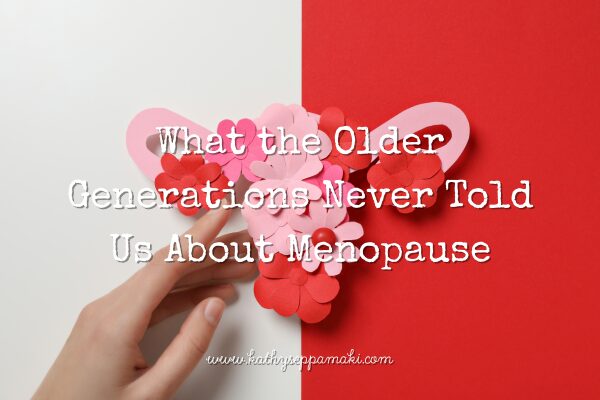Let’s be honest: when it comes to menopause, most of us have been left in the dark.
Our mothers and grandmothers may have dropped a passing comment about “the change,” fanned themselves dramatically during hot flashes, or quietly stocked up on hormone creams—but rarely did they sit us down and say, “Here’s what you can really expect.” And that silence? It left many of us blindsided. This was certainly true for me. My mom rarely talked about anything except the occasional hot flash. My grandmother didn’t speak about menopause at all.
Now that we’re in the thick of it ourselves, it’s clear there was so much they didn’t say.
Unfortunately for me as a neurodivergent woman, not only did I not know about what neurotypical women experience with changing hormones, I definitely did NOT know about the difficulties neurodivergent women face during perimenopause and menopause. Just another reason why we are called the “invisible generation”.
Here are a few things you should know about menopause…
It starts sooner than you think
Many of us thought menopause began in our 50s. Surprise! Perimenopause, the hormonal rollercoaster leading up to menopause, can begin in your late 30s or early 40s. That means years of shifting hormones before your periods actually stop. Years of feeling like you’re losing your mind… without knowing why.
Menopause is not just about hot flashes
Everyone talks about hot flashes like they’re the headline act. But menopause comes with a cast of lesser-known symptoms: anxiety, depression, rage, brain fog, joint pain, dizziness, dry eyes, insomnia, and even electric shock sensations. These aren’t always recognized as menopause-related, leaving many of us misdiagnosed or dismissed.
Your mental health might take a hit
This is the one we really needed to know. Menopause can bring crippling anxiety, mood swings, and depression…even for women who’ve never struggled with mental health before. It’s hormonal, it’s real, and it’s not “just stress” or you “not coping.” You’re not broken. You’re changing. For those who are neurodivergent and have already struggled with depression and anxiety, it can get worse. Please get professional help.
Your relationships may shift
Whether it’s your partner, kids, or friends, menopause can shake up your connections. Your libido might crash. You may find that your patience disappears. Your needs might change. And suddenly you’re questioning everything—including who you even are. No one warned us that this phase might lead to a complete identity crisis.
Doctors might not understand either
This is a hard truth: many medical professionals are not well-trained in menopause care. You might be told your symptoms are all in your head or just part of getting older. You may have to fight to be heard. Advocate for yourself. When I was struggling with joint pain, I saw more than one doctor and a chiropractor, who all told me I was dealing with issues other than what I was actually struggling with. I did the research, and I was the one to figure it out. So find a provider who gets it. And one who won’t gaslight you! You’re not imagining it—and you deserve answers.
Sleep? What’s that?
Sleep disturbances are one of the most common (and miserable) parts of menopause, and they can sneak up on you. You might fall asleep easily but wake at 3 a.m. night after night. Or find yourself drenched in sweat and wide awake, heart racing. No one told us that sleep would become such a precious—and elusive—commodity.
Menopause will change your body in unexpected ways
Yes, there might be weight gain, especially around the midsection. But also? Increased digestive issues, skin dryness, hair thinning, and aching joints. Even your sense of smell or taste might shift. No one told us how much our entire system would be affected, head to toe.
You might feel deep grief
There’s a kind of grief that comes with menopause that isn’t talked about enough. The end of fertility, the shift in identity, the letting go of youth. It’s okay to mourn. It’s okay to feel a little lost. You’re shedding a skin—and that process can feel both painful and empowering.
Your executive function becomes non-existent
If you’re neurodivergent, the mask you’ve been relying on for decades comes off. As a result, it can become next to impossible to manage tasks, solve even simple problems, make plans, or regulate your emotions. Without assistance, this period can become debilitating. This is one of the issues that almost NO ONE is talking about in the neurodivergent world. Just now am I beginning to see some mention of it.
But, menopause is also a time of powerful rebirth
Here’s what no one told us that maybe they should have: this is not the end. It’s a powerful transition into a new phase of life where we stop putting everyone else first. We get to redefine ourselves. We get to take up space. Speak up. Rest more. Live slower. Love ourselves fiercely.
Final thoughts:
Menopause isn’t just a medical event; it’s a soul-deep transformation. The silence around it has left many of us unprepared and confused. But we don’t have to keep quiet like the generations before us.
Let’s break the silence.
>Let’s tell the truth.
>Let’s support each other through this messy, magical metamorphosis.
We deserve that. And so do the women coming after us.




